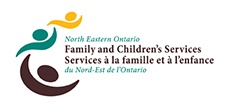Services Highlights - Year in Review
Service Data is for the 2022-2023 Fiscal Year unless otherwise noted
Service Area
Districts: Cochrane and Timiskaming
Geographic Area: 154,572 square kilometres
Population: 109,387 (2021 Census)
Population Density: 0.7 persons per square kilometre
Demographics
Language: 33% Francophone (Provincial average 4%)
First Nations: 12% (Provincial average 3%)
Prevention Services
Brighter Future
Indicator (Number of Clients Served)
- Children Served: 385
- Visits by Children: 8,091
- Parents/Caregivers Served: 364
- Visits by Parents/Caregivers: 6,725
- Total Hours of Service Provided: 3,647.60
- Participants in Workshops: 171
- Total Hours of Workshops: 311.25
EarlyON Child and Family Centres (Timmins, Kapuskasing & Smooth Rock Falls)
Indicator (Number of Clients Served)
- Children Served: 577
- Visits by Children: 4,160
- Parents/Caregivers Served: 722
- Visits by Parents/Caregivers: 3,181
Volunteer Services
Service data for the 2022 calendar year:
- Active volunteers: 17
- Total of kilometres driven: 47,418.82 KM
- Volunteer hours: 892.35
Youth Justice
Indicator (Number of Clients Served)
- Non-Residential Attendance Centres: 46
- 791.13 Hours of Direct Service
- Restorative Justice: 15
- 34.67 Hours of Direct Service
- Anger Management Program: 21
- 405.07 Hours of Direct Service
- Community Support Team: 45
- 465 Hours of Direct Service
- Youth Mental Health Court Worker: 0
Child Welfare
- 94% of children and youth served remained in their own homes
- 2,090 - Calls received concerning the safety and well-being of a child or youth
- 608 - After-hours calls received
- 1,093 - Investigations completed
- 413 - Families received Ongoing Services
- 2,897 - Children and youth served
- 110 - Children and youth in care
- 58 - Children in Kin Service Homes (KS Out)
- 72 - Children Discharged from Care
- 44 - Kin Service Homes
- 20 - Kin in Care Homes
- 33 - Foster Homes
- 15 - Adoption Homes
- 4 - Adoption Completions
- 6 - Child Welfare Community Presentations
Reasons for Admission to Care:
- Caregiver Capacity = 35%
- Physical Harm = 27%
- Harm by Omission = 22%
- Abandonment = 15%
- Emotional Harm = 1%
Age of Protection:
The Child, Youth and Family Services Act, 2017 (CYFSA) ensures that all children under the age of 18 years who are in need of protection are eligible to receive child welfare services.
-
23 VYSA Youth
The Voluntary Youth Services Agreement (VYSA) is available for 16- and 17-year-olds who require an out-of-home placement, which gives them a better opportunity to get the support they need, and have better outcomes as they transition to adulthood.
-
81 CCSY Youth
The Continue Care and Support for Youth (CCSY) aims to help youth who are 18 and transitioning from care to adulthood live independently and access counselling and other supports and programs.
Child and Youth Mental Health
Number of Clients Served - Indicator
- 2,065 - Unique Clients Receiving a Core Child and Youth Mental Health Service:
- 0-5 years old = 12%
- 6-10 years old = 34%
- 11-14 years old = 35%
- 15-18 years old = 19%
- 1,486 - Brief Service
- 4,004 hours of direct service
- 627 - Counselling & Therapy Services
- 6,932 hours of direct service
- 542 - Crisis Support Services
- 814 hours of direct service
- 178 - Family Preservation Program
- 2,760 hours of direct service
- 68 - Youth Transition Program
- 61 - Intensive Service Coordination (Rural)
- 31 - Intensive Service Coordination (Urban)
- 19 - F.W. Schumacher
- 12 - Psychological Services
- 13 hours of direct service
- 3 - Therapeutic Family Home Program
Average Wait Time:
- Counselling & Therapy Services (CTS): 25 days
- Family Preservation Program (FPP): 61 days
- F.W. Schumacher (FWS): 20 days
Child and Youth Mental Health Outcomes:
Percent (%) of Cases whose CAFAS Reassessment Showed Improvement
- 597% = Improvement on one or more Outcome Indications
- 56% = Meaningful and reliable improvement i
- 56% = Severe Impairments ii
- 75% = Pervasive Behavioural Impairment (PBI) iii
Definitions:
i: Meaningful and Reliable Improvement: improvement in total score of 20 points or more
ii: Severe Impairment: sub-scale score of 30 or more (issues in school, home, community, behaviour toward others, moods, self-harm, substance use, thinking)
iii: Pervasive Behavioural Impairment: moderate to severe impairment in all 3 areas (home, school and behaviour toward others)
Top identified reasons for service request (percentage of service requests):
Counselling and Therapy Services (CTS)
- Anxiety Issues = 14%
- Emotion Regulation/Mood Fluctuations = 12%
- Anger Management = 6%
- Separation/Divorce/Blended Family Issus = 5%
- Trauma = 4%
Family Preservation Program (FPP)
- Parenting Issues = 15%
- Child Management Issues = 13%
- Aggressive Behaviour = 8%
- Parent/Child Conflict = 7%
- Emotional Regulation/Mood Fluctuations = 6%
F.W. Schumacher (FWS)
- Anger Management = 7%
- Parent/Child Conflict = 6%
- Dishonesty = 6%
- Aggressive Behaviour= 5%
- Oppositional Defiant Behaviours = 5%
